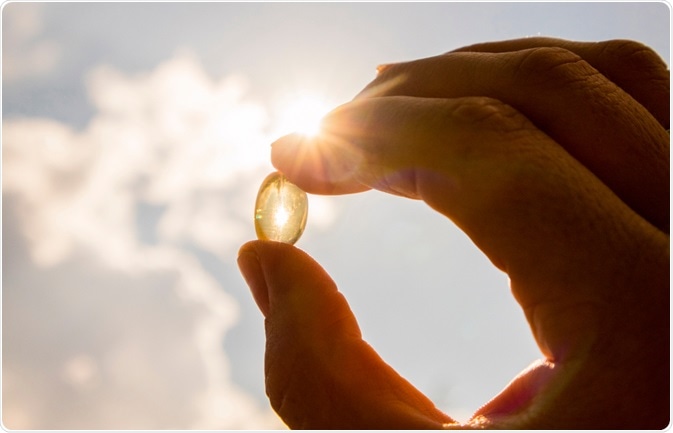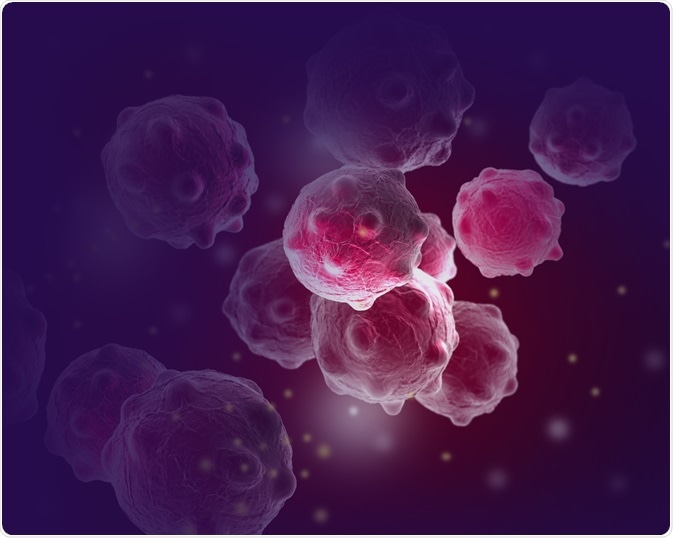Vitamin D is classified as a prohormone which, upon stimulation, helps in releasing an essential steroid hormone known as calcitriol. Research has revealed a close association between calcitriol and a reduced risk of cancer.
 Image Credit: FotoHelin / Shutterstock.com
Image Credit: FotoHelin / Shutterstock.com
Various preclinical studies have elaborated an improved prognosis of cancer with a substantial supplementation of Vitamin D.
Is there any relationship between reduced cancer risk and topographical location?
Vitamin D is also known as the sunshine vitamin, primarily because it is naturally produced upon exposure to the sun’s ultraviolet-B (UVB) rays. Individuals living in colder climates and closer to northern latitudes have shown a higher risk of developing cancers than individuals who inhabit southern latitudes.
This is primarily because of relatively higher exposure to sunlight in people living closer to the equator throughout their lives.
Studies done on mice have indicated that the growth of cancer cells was restricted in the presence of Vitamin D. Various other activities like apoptosis (cell death) of cancer cells, restricted expansion of tumor blood vessels, and promotion of cellular differentiation in cancerous cells have been shown to be stimulated by Vitamin D.
Well-differentiated cancer cells have a slower rate of multiplication than the undifferentiated cells. The presence of Vitamin D has also resulted in the prevention of the development of cancer cells.
What role Vitamin D exhibits in preventing breast cancer?
Over the past few decades, breast cancer has been recognized as the second most leading cause of death in women worldwide. Studies have shown that diet has had a role in lowering the risk of breast cancer. Diets rich in Vitamin D and rich in fibrous foods have shown to have defensive action against breast cancer.
Vitamin D is the initiator of the calcitriol-steroid hormone. Calcitriol plays a pivotal role in cancerous growth in the body. This hormone exhibits properties like prevention of cancerous cell growth via initiating apoptosis, promoting cell differentiation, and promoting anti-inflammatory and antiproliferative actions.
Hence, a substantial amount of Vitamin D in our body has the potential to lower the risk of breast cancer. However, other factors like an unhealthy lifestyle through lack of physical activity, smoking, increased weight or living in colder climates decreases the amount of circulating calcitriol.
Vitamin D is naturally obtained via foods such as fish and milk. However, cutaneous production is the best natural mechanism via which Vitamin D is synthesized in the body. Vitamin levels below 20 ng per milliliter (ng/mL) falls under the category of Vitamin D deficiency.
It is believed that circulating Vitamin D has the capability to prevent the proliferation of breast cells. The activated form of Vitamin D, 1,25‐hydroxyvitamin D is believed to exhibit chemoprophylactic action.
Circulating 25‐hydroxyvitamin D not only exhibits its chemopreventive effects but restricts the growth of cancerous breast cells via inducing differentiation, apoptosis, and angiogenesis. Healthy breast cells prevent cell growth and differentiation via the interference of Vitamin D receptor (VDR).
Cells of the mammary gland convert 25‐hydroxyvitamin D (25(OH)D) to 1,25(OH)2D through the expression of an enzyme called CYP27B1 (1∝ hydroxylase). This enzyme is responsible for the development of mammary cells at the time of pregnancy and lactation.
Research has revealed that a healthy breast cell expresses VDR, CYP27B1 and the megalin‐cubilin complex. This complex is located on the kidneys which permits the ligation of complexes formed between 25(OH)D and Vitamin D binding protein. Post fixation, 25(OH)D separates from Vitamin D binding protein and then gets converted to 1,25(OH)2D. High concentrations of 25(OH)D have been shown to be protective against neoplastic changes induced by chemical carcinogens.
The risk of breast cancer was found to be substantially reduced in women of the menopausal age group who had optimum levels of Vitamin D in the body. High levels of circulating estrogen levels increase the chances of breast cancer. Substantial amounts of Vitamin D in the blood minimizes the expression of estrogen receptors.
Though there have been many studies that have suggested the role of Vitamin D in reducing the risk of breast cancer, detailed research is still required to completely understand the effects.
 Image Credit: jovan vitanovski / Shutterstock.com
Image Credit: jovan vitanovski / Shutterstock.com
How Vitamin D is beneficial in the prevention and progression of colorectal cancer?
Metabolites of Vitamin D help in maintaining a standard calcium gradient in the epithelial cells of the colon. High amounts of circulating Vitamin D levels assist in minimizing the proliferation of non-cancerous cells. The anti-proliferative effect is achieved by inducing G1 phase of the cell cycle.
Vitamin D also exerts anti-carcinogenic action by promoting the formation of growth factors and cytokines. Moreover, Vitamin D has a synergistic effect in inducing the differentiation of cancerous cells of the colon.
Over the past few years, there has been an upsurge in understanding the effect of Vitamin D in preventing Colorectal Cancer. Vitamin D proved to be beneficial not only in preventing colorectal cancer but also in aiding regression of colorectal cancerous cell growth.
Does Vitamin D play any role in skin cancer?
Overall, various studies have proved a protective effect of Vitamin D in preventing various cancers, but exposure to Vitamin D via direct sunlight triggers skin cancers including melanoma and non-melanoma skin cancer.
Experts suggest that consuming a diet rich in Vitamin D is an ideal way of supplementing the body with adequate amounts of Vitamin D as taking in Vitamin D via direct exposure to sunlight increases the risk of skin cancer due to exposure to UV radiation.
References and Further Reading
Zeeb H et al. (2010). The role of vitamin D in cancer prevention: does UV protection conflict with the need to raise low levels of vitamin D?. Deutsches Ärzteblatt international. doi: 10.3238/arztebl.2010.0638
Yagüe Puente De La et al (2018) Vitamin D: And its role in breast cancer. The Kaohsiung Journal of Medical Sciences. 2018 Apr 5;34(8):423-7. doi: 10.1016/j.kjms.2018.03.004
Mamede AC et al (2011). The role of vitamins in cancer: a review. Nutrition and cancer. DOI: https://doi.org/10.1080/01635581.2011.539315
Tavares Sonia et al The role of vitamins in cancer: a review (2011) DOI: 10.1080/01635581.2011.539315
Polly P et al (2014). The role of vitamin D in skeletal and cardiac muscle function. Frontiers in Physiology. 2014 Apr 16;5:145. doi: 10.3389/fphys.2014.00145
D. Feldman (2014) The role of vitamin D in reducing cancer risk and progression. DOI:10.1038/nrc3691
Kang W, et al (2011). Emerging role of vitamin D in colorectal cancer. World journal of gastrointestinal oncology. https://www.ncbi.nlm.nih.gov/pmc/articles/PMC3192221/
Vitamin D and Cancer Prevention. National Cancer Institute. https://www.cancer.gov/about-cancer/causes-prevention/risk/diet/vitamin-d-fact-sheet
Harvard T.H. CHAN. Vitamin D https://www.hsph.harvard.edu/nutritionsource/vitamin-d/#:~:text=Also%2C%20laboratory%20studies%20show%20that%20vitamin%20D%20can,and%20scientists%20are%20actively%20investigating%20other%20possible%20functions.
Skin Care Foundation.Vitamin D & Sun Protection. (2020) https://www.skincancer.org/skin-cancer-prevention/sun-protection/vitamin-d/
Further Reading
Last Updated: Jan 18, 2021